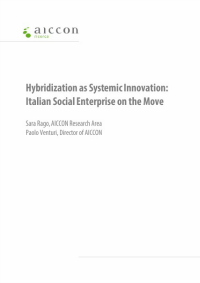Hybridization as Systemic Innovation: Italian Social Enterprise on the Move
Paper presentato da Sara Rago di AICCON Ricerca in occasione della sesta edizione dell’International Social Innovation Research Conference (ISIRC) che si è svolta dall’1 al 3 settembre 2014 a Northampton.
ABSTRACT
The paper aims to explore hybrid organisations focusing on experiences originated by Italian social entrepreneurship. Moving from the assumption that social co-ops can be considered as “original” hybrid organisations, the paper aims to understand new forms of hybrid organisations (so called “second generation hybrids”) as result of social innovation paths. In that sense the paper firstly aims to highlight “generative mechanisms” (having exogenous as well as endogenous origins – e.g. the Italian legislative decree n. 179/2012 on start-up enterprises, the promotion of community enterprises, impact investing tools, and so on). Then an additional goal is to point out specific elements to define characteristics of organisational hybrids originated by social co-ops that according to literature on hybrids are: business model, organisational form, leadership style, governance, and financial resources structure. These topics allow to highlight some key elements useful to advise entrepreneurs and policy makers on social innovation promotion and development.
Hybrid organisations recently introduced a new way in doing enterprise. Hybrids are entrepreneurial entities whose main goal is pursuing systemic social improvements (social innovation) though their business. In other terms, they are agents of the so called “systemic innovation”, that is “an interconnected set of innovations, where each one influences the others, with innovation both in the single parts of the system and in the ways in which they are interconnected” whose “benefits can be realized only in conjunction with related, complementary innovations” and “that require significant adjustments in other parts of the business system they are embedded in”. Particularly, in Italy a strong attempt in dealing with social needs to develop well-being and community growth levels is introducing new forms of social entrepreneurship that could be identify within hybridization processes originated by Italian social co-ops (both individually and within networks/consortia).
The paper is firstly based on a literature review on hybrid organisations aimed at point out the definition, generative processes, specific elements describing hybrids – business model, organisational form, leadership style, governance, and financial resources structure – at international level. Moreover a database collecting information on 74 hybrid organisations originated from Italian social co-ops (particularly within CGM Co-operative Group) is the second type of resource used. Finally a relevant Italian case study has been developed in order to explore hybridization processes’ characteristics more in depth.
Keywords: hybrid organisations, social enterprise, social co-operation, innovation, institutional change

